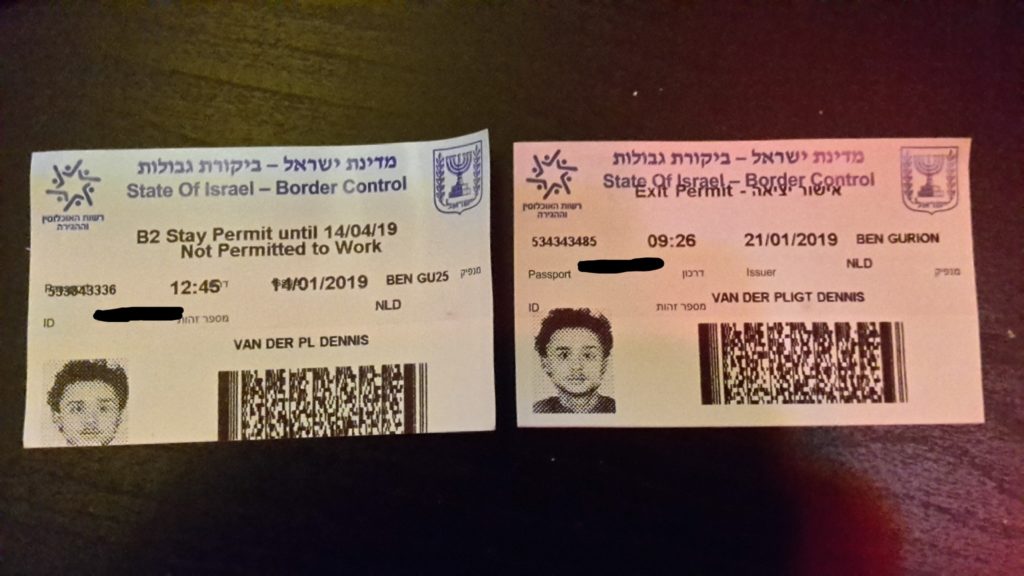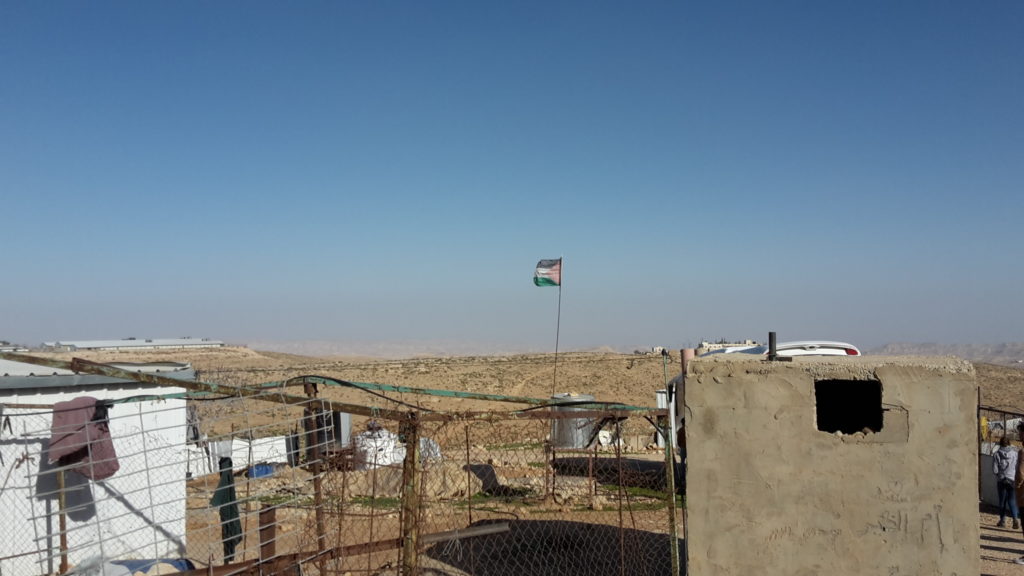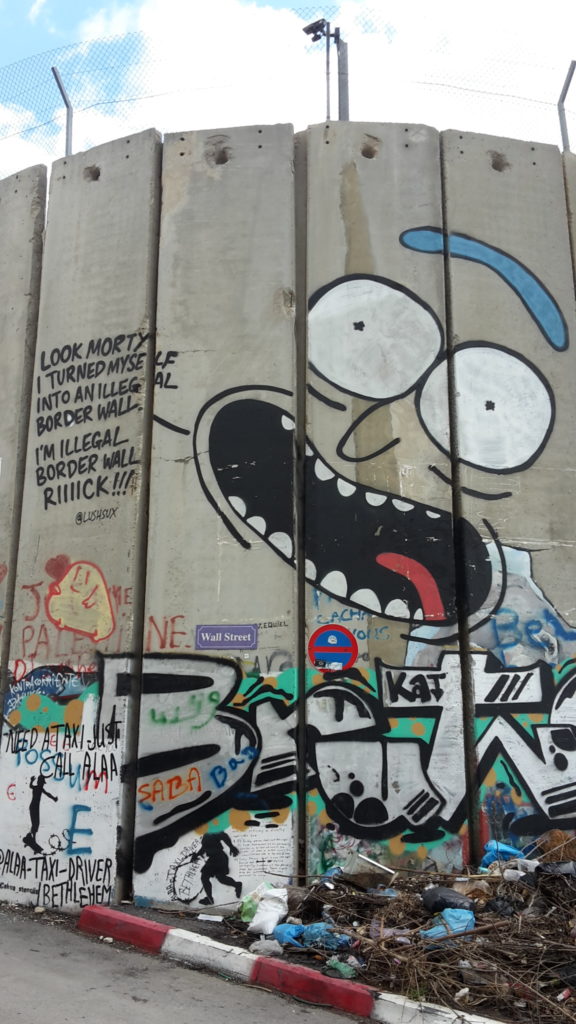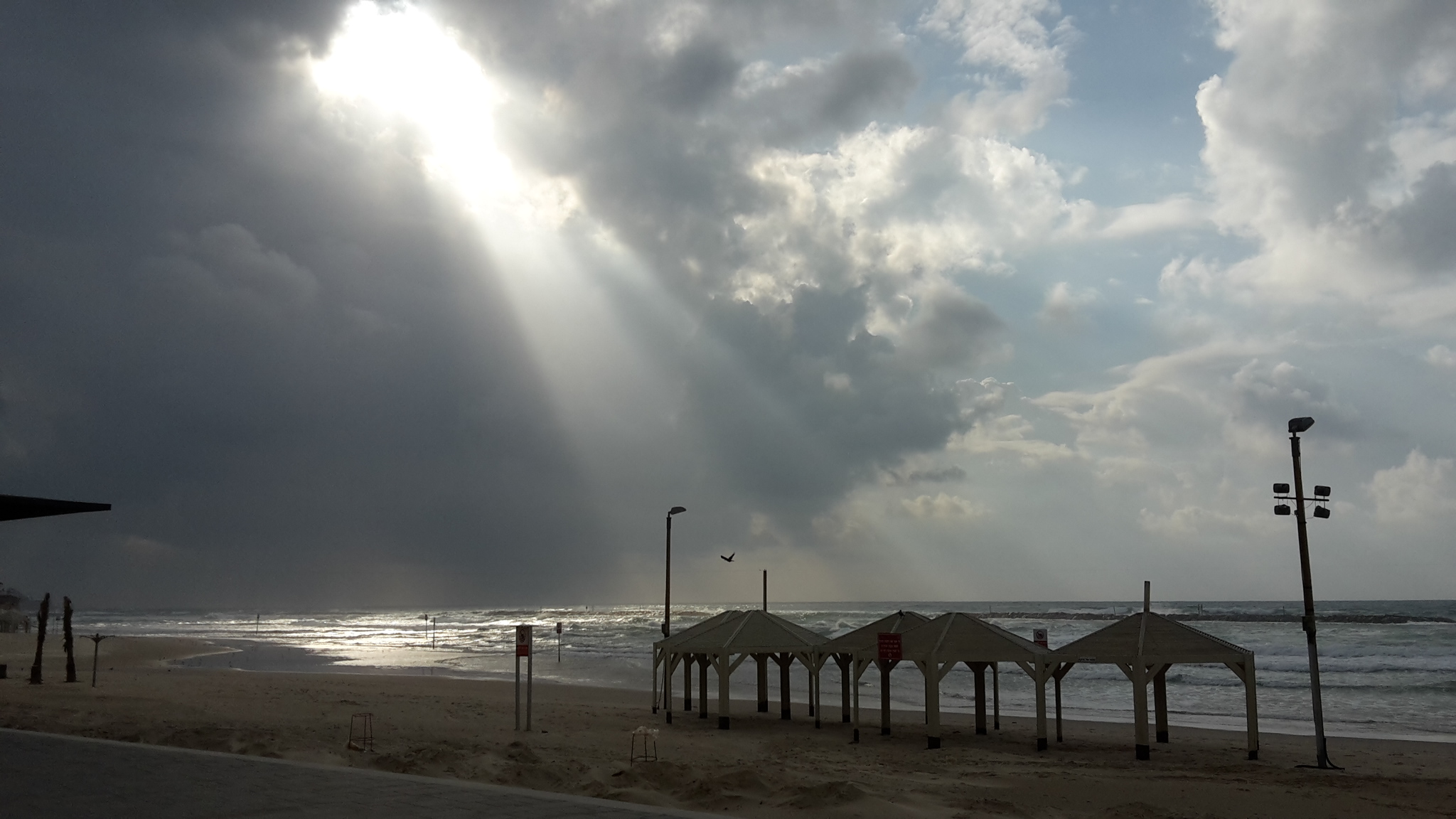Last January I went on a field trip with Radboud University to Israel and Palestine. We were about forty people, mostly students and some teachers, with the aim of witnessing the ongoing conflict. First we visited Tel Aviv and Jaffa, but we spent most of our one-week stay in Jerusalem. Especially interesting was the West Bank, the territory that Israel’s armed forces occupy and is reason for a lot of internal and international dispute. When leaving the country again, I was asked some questions by the Israeli security personnel at the airport: time to contemplate.
“You do know that this is only one side of the story, right?” said the security supervisor, sternly, after her colleague had found my copy of Breaking the Silence: Soldiers’ Testimonies from the South Hebron Hills. At first the security personnel of Ben-Gurion Airport had checked my bag in relative casualness.
But when they spied that black cover, they put the book aside as if it contained something fatally contagious. I admitted I had gotten it during a tour with Breaking the Silence, an organisation composed of former Israeli Defense Force (IDF) soldiers who seek to show how violent and wrong their army’s occupation of the West Bank is. Often, members of their own government brand them traitors.
My traveling companion and I then got the impression the security people were playing the waiting game with us. Indeed it took a while until they continued their inquiry into the threat we could possibly pose. While half sitting on the table full of my luggage, I thought of a story a Palestinian man living in the West Bank told us.

The Goat behind the Wire
Sounding as if they were birds having a hard time to take off and fly, some Palestinian flags fluttered in the wind above the village. Its inhabitants herded goats and so a whole flock of them paraded below a ridge on which a Jewish settlement stood, fenced to keep out Palestinians. One day, a Palestinian man explained, one of the goats -the bravest or most ignorant- sought to defy the might of the barbed wire and broke into the Israeli side.
Since these animals are a good measure for quality of life in these parts, this one needed to be retrieved, so a Palestinian woman hurried to that task. Suddenly, a few gunshots went out into the air. A final one was on target, however. It failed to kill her though, and her fellow shack-dwellers called for help. No one came. They rallied neighbouring Palestinian villages to pressure the authorities with more phone calls. But when the ambulance finally arrived, the army did too.
Instead of arresting the Israeli settler who had pulled the trigger, the military decided to interrogate the severely wounded woman. What had she been doing on the other side? Why? What was she thinking? It turns out those Palestinian flags above the village were hardly waving in defiance. If anything, they symbolised a last stand of a people that were suffering a grave and perhaps final defeat.

More than a Game
Afraid that it was some one-sided visit to her country, the security supervisor had hoped we had also visited places that tell the Israeli story. Without a moment of hesitation I proclaimed “Yad Vashem!” Like the southern West Bank, for some of us this Holocaust museum invoked very sad feelings, wrecking to the sensitive soul.
Our tour guide, Julia, was a great storyteller. And although she claimed she wanted to inform rather than invoke emotional reactions, she really drew me into 1930s and 1940s Europe. Perhaps I would have burst into tears right then and there, if not for one particular piece.
Halfway through the museum a Monopoly game can be found on display. It almost felt like a mocking joke, since the theme of this particular version was Ghetto life, almost as if it forbode the Disney and Game of Thrones editions we now know today. However, Julia explained that rather than mockery it was made to endure the dreadful situation a bit more light-hearted. Pretty much like Guido tried to do in the movie La vita è bella. And it worked. I could feel or at least imagine how such a small thing as a game could help you through the darkest of days.
Being Human
“Uhm, that probably showed a lot of the Israeli perspective”, I muttered, realising that to explain all the feelings Yad Vashem invoked would be a way too complicated thing to do right then and there. Uncontent, the security supervisor’s mouth hardened into a line. “But we also heard a lot of stories from Israeli people, about the fears they have, of family members they have lost.”
Indeed every Israeli seems to know someone who was killed or injured in the many wars Israel fought and suffered. We heard stories of family members serving in the IDF who stepped on landmines; people whose houses were shot at from an adjacent neighbourhood; soldiers captured and tortured during operations in Lebanon; people affraid to take specific routes to their work or school because these were often targeted during the last Intifada; stories of people hearing gunshots and hurrying to see whether their children are okay. “That is not a life”, our tour guide in Jerusalem rightly stated.
Yet she works for Ir Amim, an Israeli organisation that advocates a future for Jerusalem that is agreed upon across ethnic divides. This means that she often has bitter disagreements over the ongoing conflict with her family, who lean more to the political right. All the stories of grief told by Israelis should be listened to, she emphasised, but also added that one mustn’t forget Palestinian suffering: “we’re dealing with human beings, if you for one moment forget that, than I have completely failed telling you these stories.”
And she is right. One’s own grief and fear does not in itself legitimise your oppression of someone else. Also, you should not pick a side solely based on ‘Israeli’ or ‘Palestinian’, but recognise all the suffering. In this shared experience, peoples might come together.
“Jews Invented Barbecue”
In this sense she echoed what Breaking the Silence claimed: the occupation of the West Bank, and the maltreatment of the Arabs in general is bad for Israel. It is a stain on their honour and does not help Israel with its quest for national security, on the contrary: it causes many Palestinians to resent the Israeli ‘other’ even more. I guess a significant part of the problem is that many Israelis don’t feel that they have the luxury to loosen their control of the situation.
This tight grip expresses itself in so-called ‘demolition orders’. West Bank Palestinians require a permit from the IDF if they want to build anything. In the vast majority of cases they don’t get one, presumably because they have to be kept weak in the ethnic struggle. Yet they construct simple houses and a collective oven in their villages for bread. After all, one has to stay warm and eat. Then the IDF appears and puts a demolition order on those illegal houses and oven, and destroys them.
Among other things, the IDF is tasked with protecting extremely religious Jews, who see it as their God-given right to inhabit the West Bank. Sometimes, when things really get ugly, the IDF even has to protect Palestinians from them: Jews throwing rocks at Palestinian school children is beyond the ethics of the IDF. One or two soldiers even followed our bus to protect us, given that these extremely religious Jews are not too keen on tourists either.
Over in Jerusalem our Ir Amim tour guide explained that such zealots are becoming stronger through “making their presence felt”. “Jews invented barbecue you know”, she said, ridiculing her own ethnicity, “to show how devoted they are, they recently sacrificed a goat at the Temple Mount, as proscribed in the Torah”.
I Wonder
One complaint I tend to have with religion and Christendom in particular is how many miracles took place so long ago. If God is so perpetual a being, sure he could conjure up some new ones to strengthen the faith of today’s believers. For instance, the place where I live, Nijmegen, is famous for a miracle that happened more than four centuries ago. However, in the Palestinian town of Ramallah during a visit to the Eastern Orthodox Church of Transfiguration we were told of a recent extraordinary event.
A loud bang had caused a window of this house of God to shatter. One man who devoted his life to this church went to clean up the shards of glass and pieces of wall. While doing so, he clumsily cut is hand. One of his fellow clergyman and he himself then witnessed something miraculous: as he swiped away the blood there appeared to be no wound at all!
A handyman of sorts came to the church to find out what was wrong with the building. And surely, he thought, there must be some logical explanation for the disappearance of that wound. Had it been an injury in the first place? Was it not just some reddish paint? But as he was about to enter the church, an undefinable ‘energy’ stopped him. Only later when he returned and proclaimed that he had left his tools in his car and was here just to embrace God, the handyman could freely enter.
Amazing, truly, that one is able to believe this: the mental power it must take. And perhaps it is real, who knows. I must admit there is a certain beauty to such devotion, about as beautiful as the colourful images in the church depicting many a biblical scene. Yet I could not help but cynically wonder how this place of prayer would fare against an IDF demolition order.
Everyone Pushes
Ironically, way more interesting than the notion that Jesus was born in that place, were the people we met when we paid a visit to Bethlehem. A soft-faced Palestinian man offered to show us around in the Church of the Nativity. But as he was sharing his knowledge and love for history with us, he stumbled into an argument with an Israeli acquintance. The friendly pats on each other’s backs their encounter had started with were quickly forgotten.
All the while, a huge mass of tourists pushed us towards Jesus’s presumed birthplace like a flock of goats herded in that direction. Were He alive, I am sure He would have been confused and even a bit ashamed. Is this what He suffered for on the cross? Some people who find themselves so important that they would shove and hustle just to see the cave where Jesus Christ joined our lousy race?
“We cannot go anywhere, we cannot work where we want because of all the checkpoints” the Palestinian guide said. The Israeli rebutted: “but we have to protect ourselves, because you’re all terrorists”. The sweet-looking Palestinian got angry and frustrated: “who is the terrorist?! your army killed hundreds of children in Gaza!” The comment was lost on the Israeli, who walked away with some sort of chuckle, appearing as if he did not take that claim too seriously.

